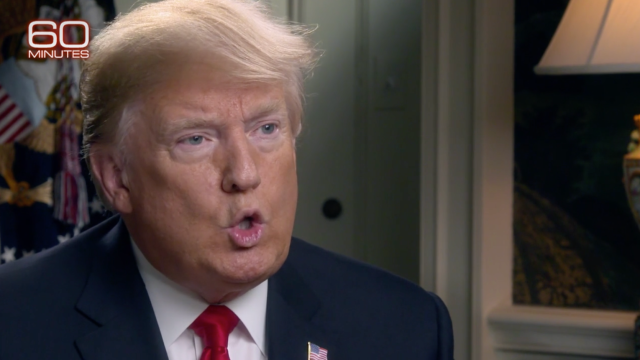Last week was a wild climate ride, from a landmark Hurricane Michael decimating northwest Florida. If ever there was a time for the media to finally ask politicians about their plans to address climate change, this was it. And for once, the media delivered.
Unfortunately, the politicians they had on did not.
Sunday featured President Donald Trump’s economic advisor, Larry Kudlow, on ABC’s This Week, Senator Marco Rubio on CNN’s State of the Union, and Trump himself on 60 Minutes. All three were pressed on climate change, using both Hurricane Michael and the international report as a jumping off point for probing their climate beliefs. They each showcased a facet of an emerging form of climate denial that’s more insidious than previous iterations embraced by the Republican party. By mixing half truths and sleight of hand, it can sound reasonable when it’s anything but.
Kudlow was asked about the new UN climate report’s findings that we need to bring carbon emissions to 45 per cent below 2010 levels by 2030 to limit global warming to 1.5 degrees Celsius. His response? Nothing to worry about here.
“I don’t think we should panic, he said. “I don’t think there’s some imminent catastrophe coming.”
The thing is, he’s wrong. We have already seen changes from deadly heat waves to more powerful storm surge that are boosted by climate change with more painful impacts down the road if we keep twiddling our thumbs. Meet the Paris Agreement goals could save the world $US20 ($28) trillion in damages according to a recent estimate published in Nature, just one of many studiey to find benefits measured in trillions.
Kudlow also fell back on the old chestnut of questioning how much humans have contributed to warming the planet. The answer is all of it.
Those talking points were echoed almost verbatim by Rubio in his interview with CNN’s Jake Tapper, who also claimed he’s a climate leader (he has a lifetime score of 5 per cent on the League of Conservation Voters’ environmental scorecard). But perhaps most interesting, he said some of the quiet part out loud when Tapper asked him what he would tell his children in 20 years as far as actions he took to help mitigate climate change.
Here’s his response:
“Well, certainly, mitigating sea level rise, because no matter what we do—no matter what we do with laws—if, tomorrow, we stopped all carbon—let’s say we went to all solar panels and did all that stuff, which is not realistic, there still would be—this still—this trend would still continue.”
It is perhaps the most honest thing Rubio has ever said on climate science. But it also shows a failure to understand the reality that while we’ve baked a certain amount of change into the system, we can still cause dramatically less harm by winding down our emissions sooner rather than later.
All that brings us to the president. In January, I wrote that it was time to stop analysing his climate beliefs after a sit-down with Piers Morgan. I think that still holds true. Climate change requires global cooperation, and that’s in total opposition to Trump’s binary, winner-take-all worldview. Rather than change that worldview in light of recent events, he’s clung to it and continues to cast doubt on the science.
To wit, a snippet from Trump’s recent interview with Lesley Stahl:
Donald Trump: I’m not denying climate change. But it could very well go back. You know, we’re talking about over a millions—
Lesley Stahl: But that’s denying it.
Trump: —of years. They say that we had hurricanes that were far worse than what we just had with Michael.
Stahl: Who says that? “They say?”
Trump: People say. People say that in the—
Stahl: Yeah, but what about the scientists who say it’s worse than ever?
Trump: You’d have to show me the scientists because they have a very big political agenda, Lesley.
Stahl: I can’t bring them in.
Trump: Look, scientists also have a political agenda.
His response to questions on climate change is telling. Trump can only project his self-serving motivations onto others, rather than recognising that scientists can separate their politics from their research. Taken with Rubio and Kudlow, it shows the climate denial machine is still humming along by misrepresenting science, playing up uncertainty, and throwing hands in the air when asked for solutions.
Overall, it’s a welcome shift to see mainstream news dig into climate change. But it also shows there’s much more work to be done.
“Reporters need to educate themselves not only on facts of climate science—in particular the percentage of scientists who attribute climate breakdown to human activity—but also on climate deniers’ rhetorical techniques, so that they will be ready to refute climate denial when they encounter it,” Genevieve Guenther, a lecturer at the New School and founder of EndClimateSilence.org, told Earther. “Even more importantly, they must be willing to refute climate denial, lest they unwittingly turn their news programs into platforms for airing dangerous lies.”
Oh, and maybe the media can also start having some folks with actual climate solutions on the air, too.
